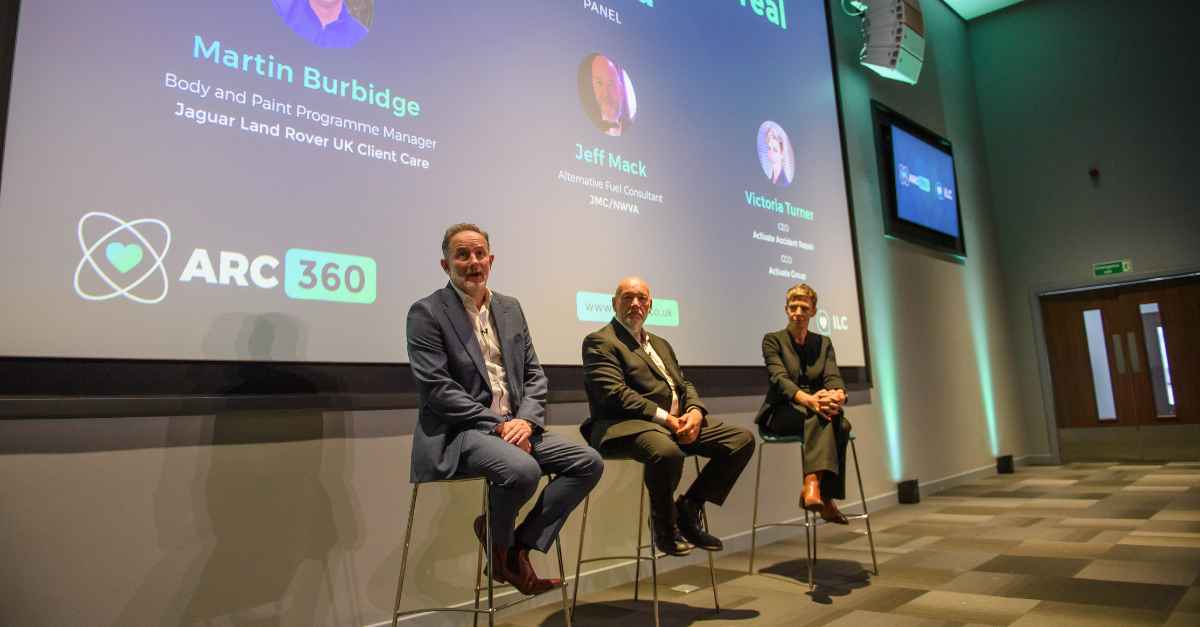Information sharing and better communication between manufacturer, insurer, repairer and customer is critical to managing EV claims – but so too is a mindset that accepts the evolution is ongoing.
That was the overarching message of a session entitled, Managing EVs in the Real
World, which was held during ARC360’s specialist EV event, EV-olution, at the Manufacturing Technology Centre, Coventry.
Taking part in the conversation were Jeff Mack, Alternative Fuel Consultant, JMC/NWVA, Victoria Turner, CEO of Activate Accident Repair and COO of Activate Group, and Martin Burbidge, Body and Paint Programme Manager, Jaguar Land Rover.
Martin said that EVs have changed the game, with information sharing throughout the supply chain among the most significant challenges.
He said, “Once you’ve built the vehicle the question is how do you make repair information available to the industry. The challenge for us is making sure the retailers and network are able to safely power down and repair EVs.
“It all adds cost, especially as there are differences between all manufacturer-training, and even within one manufacturer the training needs to be continuous because every new model comes with new safety rules around batteries. But it’s up to VMs to ensure the information is available.”
FNOL
One way to reduce costs throughout the claims journey is to ensure the vehicle is on the right repair journey from the outset, and that means gaining as much information as possible at FNOL.
Victoria said, “Ensuring a smooth claims journey for an EV begins the moment of the collision. As always, it’s about information and you need as much information as possible at FNOL. You need to know what has happened, the vehicle it has happened to, and the damage profile.
“Understanding the circumstances of the incident and then working with people qualified to take the claim forward is essential. As an industry, we’re responsible for looking after customers so we need to identify really quickly if there is a safety risk, and then deploy experts if there is.”
Safety
EVs have also changed the game for first responders, and Jeff says the key message is: know what you’re dealing with and how to deal with it.
NWVA has now developed a seven-hour IMI-approved course to help recovery drivers stay safe and keep their customers safe.
Jeff said, “We’re learning new things every day. The biggest issue is people saying it’s too costly to do the training, but the risks of a lack of knowledge are too severe. The first step is knowing what you’re dealing with, or you may end up sending the wrong person with the wrong recovery vehicle to the scene.”
Certainly training is a concern in an industry already operating on tight margins. In fact, a live survey of attendees during the sessions identified knowledge and training as the biggest EV challenge.
However, training, along with recycling, was also listed as one the greatest opportunities.
Victoria concluded, “Change is a given and everything becomes normal after a period of time. We’re getting better at triage and automation, and we’re getting better at looking after the customer journey as a result.
“The next five years is about repairers investing in their businesses so they’re qualified and able to repair EVs, but beyond that, more change is coming and we need to work together. There is no logical reason to break the EV challenge down into different sections and tackle it independently. The only way we get through this is to be informed from the start of the journey to the end of the journey, and to make good decisions.”
ARC360’s specialist EV-olution event was sponsored by Thatcham Research and ControlExpert, along with ARC360 Corporate Partners: BASF, CAPS, Copart, Entegral, Enterprise, Mirka, Nationwide Vehicle Recovery Assistance, S&G Response, and Solera Audatex, and Partners: Gemini Accident Repair Centres, Repairify, and Prasco UK.
















